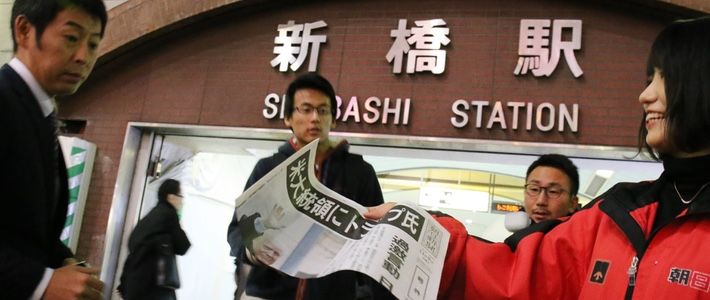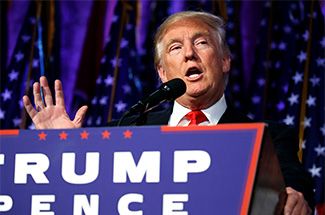
First Polls After Trump’s Victory Show Uneasy Japanese Public
Politics- English
- 日本語
- 简体字
- 繁體字
- Français
- Español
- العربية
- Русский
As the Japanese government scrambles to react to Donald Trump’s upset victory in the November 8 United States presidential election—and with Prime Minister Abe Shinzō expected to be the first world leader to meet with Trump this Thursday, November 17—new opinion polls suggest the Japanese public is uneasy about the impact of the election on the US-Japan relationship. Most Japanese, after all, preferred Democratic candidate Hillary Clinton to Trump: An Asahi Shimbun poll conducted in October found that 79% believed Clinton to be the best choice, compared with only 3% who answered Trump. The Japanese public was well informed about Trump’s longstanding views of the US-Japan relationship, which he has said he believes is fundamentally “unfair” since the United States provides an asymmetrical security guarantee that enables Japan to spend less on defense while its producers enjoy access to the US market.
Given Trump’s attitudes towards Japan and uncertainty about his priorities upon taking office in January, it is not surprising that an NHK poll conducted on November 11–14—after the election—found that 37% of respondents believe the US-Japan relationship will worsen, 35% think it will be unchanged, and only 5% think it will improve under President Trump. The findings of a Yomiuri Shimbun poll conducted on November 12–13 were even more pessimistic, showing that 58% of respondents expect that “instability” will grow; another 30% expect a mix of “instability and hope.” Only 8% are hopeful about the relationship going forward. The Yomiuri poll found that Japanese are only slightly more inclined to view Trump favorably than before the election, with 62% saying that his victory was “not good” and only 15% saying it was “good.”
▼Further reading The Fate of Japan’s Alliance with Donald Trump’s America The Fate of Japan’s Alliance with Donald Trump’s America The Japan-US alliance has been shaken by Trump’s campaign statements. What must be done now to keep it—and regional affairs—stable and strong? |
Similarly, Trump’s calls for Japan to contribute more to the relationship—and to costs associated with hosting U.S. forces in Japan, in particular—has been received coldly by the Japanese public. After all, in the fiscal 2016 budget, Japan budgeted as much as ¥193.3 billion ($1.8 billion) for host-nation support. Yomiuri found that 68% want to keep Japan’s contributions at their current levels, 24% want to cut contributions, and only 5% want to increase them. Similarly, the NHK poll found that 50% support the current levels, 34% want to cut contributions, and only 5% want to increase them. This suggests that if the Trump administration does demand that Tokyo discuss how it can contribute more to the alliance, Abe could be constrained by public opinion from making significant concessions.
That said, it is possible that Trump’s victory could be good for Abe’s political standing. The cabinet’s approval ratings were already over 50% in Sasakawa USA’s 10-day moving average of opinion polls, and the NHK poll recorded a 5-point jump in approval to 55%, along with a 7-point drop in disapproval to 26%. Abe’s support depends heavily on the belief that it is better—and more stable—than the alternatives. To the extent that Trump’s election anticipates greater uncertainty regionally and globally as US allies and adversaries wait to see whether the president-elect will follow through on his promises to pursue an “America First” foreign policy, that uncertainty will likely strengthen Abe’s support as he can argue that a stable government is indispensable in the current risk environment.
(This article is republished through a partnership with the Sasakawa Peace Foundation USA. Click here to view the original article. Banner photo: A woman in front of Tokyo's Shinbashi Station hands out newspaper extras announcing Donald Trump's victory on November 9, 2016. © Jiji.)security Abe Shinzō Donald Trump Japan-US ties public opinion